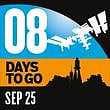UAE in Space: How Hazza will inspire youth, society
Emirati astronaut’s spaceflight will have transformative socio-economic impact

This is the third report in a 10-day countdown for the launch of UAE’s first man in space.

Dubai: The UAE Mission 1 to the International Space Station (ISS) on September 25 is just one of the foundational space activities the country is taking on that will have a transformative socio-economic impact on the country’s future, a senior UAE official said.
In just eight days, the UAE will have its first man in space and first Arab on the ISS. Emirati astronaut Hazza Al Mansoori will raise the UAE’s flag ‘higher than it has ever been’. His colleague Sultan Al Neyadi serves as the reserve astronaut who is also in Baikonur Cosmodrome in Kazakhstan for the launch.
The two were chosen from 4,022 candidates who vied to be part of the UAE Astronaut Programme under the Mohammed Bin Rashid Space Centre (MBRSC).
On launch day, Hazza will board a Soyuz MS-15 spacecraft with Russian commander Oleg Skripochka and Nasa astronaut Jessica Meir, who will also be in space for the first time.
His eight-day stay in space will be packed with 16 scientific experiments and an ISS tour in Arabic. The trip may be short, but it is only the beginning, said Dr Khaled Al Hashmi, director of Space Missions at the UAE Space Agency.
“This is only the first trip,” Dr Al Hashmi, who is also the director of National Space Science and Technology Centre at UAE University, told Gulf News. “Hopefully in the future we will have longer missions.”
Sustainable programme
“The beauty of this UAE Astronaut Programme is it’s a sustainable programme. It’s not only Hazza. The UAE aims to train a core astronauts for future missions as well.”
Dr Al Hashmi said the UAE’s space sector’s future holds much promise as seen through Hazza’s mission.
“There are two impacts: local and regional or international. Locally, this will trigger the awareness and ambition among youth in the UAE to follow Hazza as an example to be future astronauts, whether male or female,” Dr Al Hashmi said.
The beauty of the UAE’s Astronaut Programme is that it is sustainable. It’s not only Hazza. The UAE aims to train a core group of astronauts for future missions.

“Regionally, all our leaders want to move away from the troubles the Arab world has been facing in recent history. Hazza’s trip can be an example for other countries to follow.”
“Also [the trip] is important for us in the UAE because the UAE has a long vision for space which includes the UAE’s long-term vision to build the first inhabitable human settlement in Mars by 2117. These cannot materialise unless our people start now, especially the youth. Some people will dream to be like Hazza.”
Ripple effect
The mission will spark interest among the youth to pursue the fields of science, technology, engineering and mathematics (STEM) as the UAE pursues a knowledge-based economy. This means the country will need more space scientists, engineers and technicians in the coming years to sustain the programme.
This spark will have a ripple effect in society, just like what the moon missions did from the 1960s onwards.
“When they announced the mission to the Moon, it mobilised universities, triggered for more universities to be set up and courses to be introduced,” Dr Al Hashmi said.
“Now, we are seeing the University of Sharjah with the Sharjah Academy for Astronomy, Space Sciences and Technology, Khalifa University has a [space sector R&D] and a Space Systems and Technology Master’s concentration, the UAE University has a new Space Science Track, the American University of Sharjah has Astrophysics and Space Science [among others]. So we measure the impact of Hazza’s mission and the country’s space programme by how other stakeholders are interacting with this vision.”
Contribution to economy
The UAE’s space sector is deemed as one of the most promising new sectors that will contribute greatly to the UAE’s economy. Investments in the space sector increased from Dh20 billion in 2015 to more than Dh22 billion in the first part of 2019.
The space sector is also expected to create new jobs, attract global investments aside from creating a new generation of young professionals.
“To the youth today, we are lucky to have our leadership. In less than 50 years, the UAE was established from a very basic village to having a mission to Mars and this amazing achievement [to reach the ISS],” Dr Al Hashmi said.



